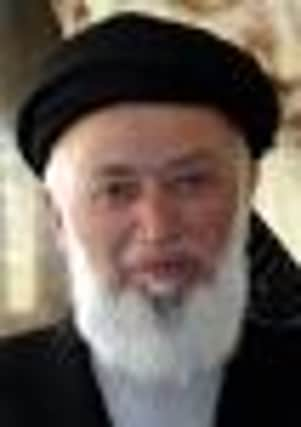Turban bomber kills Afghan leader


Burhanuddin Rabbani had led a peace council trying to build contact with the Taleban to end the decade-long war.
President Hamid Karzai cut short a visit to America over the assassination, reflecting the importance of Mr Rabbani in seeking a resolution to the conflict.
Advertisement
Hide AdAdvertisement
Hide AdThe bomber entered Mr Rabbani’s house in the evening and detonated the device inside, Kabul police said. The assassin had not been searched, and set off his bomb after shaking Mr Rabbani’s hand and bowing as a sign of respect.
Mr Rabbani was the leader of the Northern Alliance, which had opposed the Taleban on the battlefield. His death could unleash a well of resentment among former Northen Alliance members angered at president Karzai’s perceived collusion with their former enemies.
Shukria Barakzai, an MP from Kabul, was visibly shaken as she stood outside Mr Rabbani’s house in the heavily guarded Wazir Akbar Khan area of the city, which has many diplomatic missions.
“We don’t want the whole peace process to get stuck,” she said. “We have to continue, we have to.”
Mr Rabbani, who was about 70 years old, headed the country’s High Peace Council, which was set up by the Afghan government to work toward a political solution to the war. However, it had made little headway since it was formed a year ago.
Just last week, Mr Rabbani led a conference of provincial governors and officials who met in the southern city of Kandahar to develop policies for reintegrating insurgents who want to give up the fight.
The reintegration of lower-level militants has started alongside the push for higher-level peace talks as a way to whittle away at the insurgency at both ends. At the conference, he urged those in the provinces to work to counter insurgent propaganda claiming that international forces were invaders in Afghanistan.
Mr Rabbani was president from 1992-1996, heading the Afghan government that preceded the Taleban rule. After he was driven from Kabul in 1996, he became the nominal head of the Northern Alliance, mostly minority Tajiks and Uzbeks, who swept to power in Kabul after the Taleban’s fall. Mr Rabbani, an ethnic Tajik, headed the Jamiat-e-Islami political party.
Advertisement
Hide AdAdvertisement
Hide Ad“We lost our leader. We lost our leader,” Habibullah, a close friend of Rabbani’s, said as he stood crying outside a hospital.
Already Afghanistan’s ethnic minorities have begun to re-arm in the face of negotiations with the Taleban. Mr Rabbani’s death is likely to accelerate the re-arming and lay the foundation for a bitter civil war once Nato troops leave the country or take on support roles by the end of 2014.
Abdullah Abdullah, a Tajik leader who lost to Mr Karzai in the 2009 presidential election, said Mr Rabbani’s loss was significant.
“He was a jihadi leader. From the beginning to the end of his life he did his best to bring peace and stability to this country and it is a big loss for all Afghan people,” Mr Abdullah said.
Mr Abdullah, who has been critical of attempts to reconcile with the Taleban, said that “we should recognise and know our enemy from lower ranks up to the top … because by any means, they are trying to kill us and eliminate all jihadi leaders.”